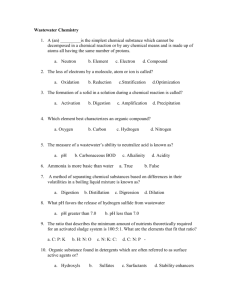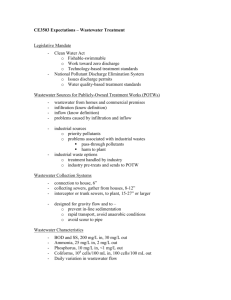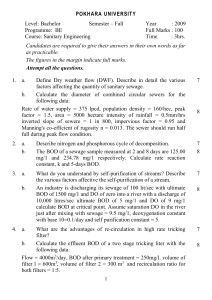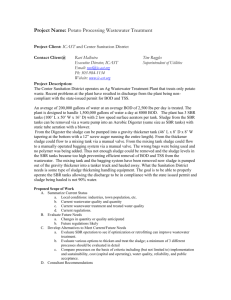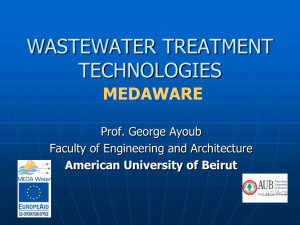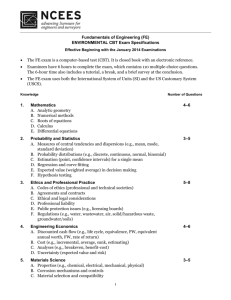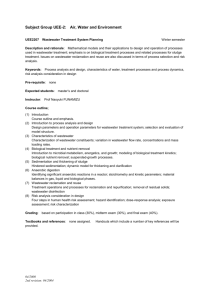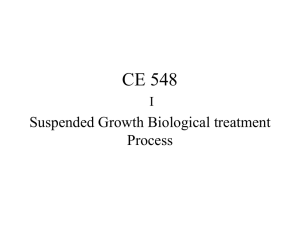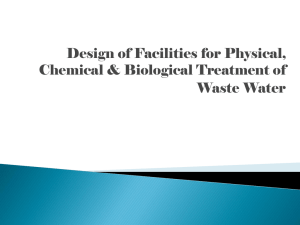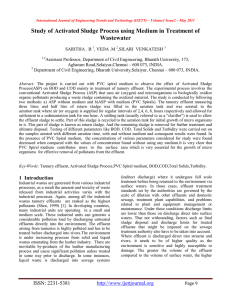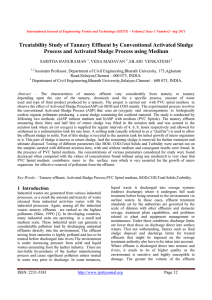PPT - OMICS International
advertisement
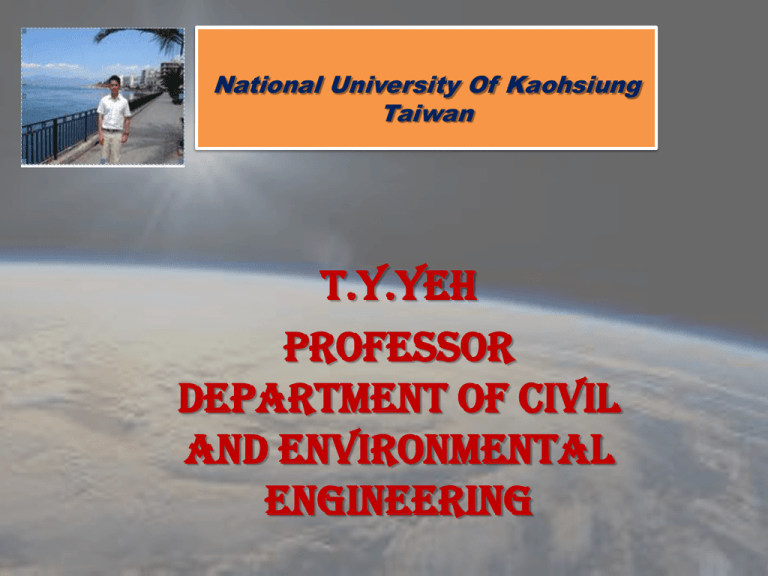
National University Of Kaohsiung Taiwan T.Y.Yeh Professor Department of Civil and Environmental Engineering • Yeh was born in Taiwan, in 1965. He received a Batcher degree in environmental engineering from National Chung Kung University in 1987, received a Master’s degree in Civil and environmental from UC Berkeley in 1992 and a Ph.D. degree in Civil and environmental from Penn State University in 1997. He is a professor in the department of Civil and environmental engineering at National University of Kaohsiung. • Usually refer to sewage treatment, or domestic wastewater treatment • process of removing contaminants from wastewater, both runoff and domestic Where does wastewater come from? • Residences (kitchen, bathroom) • Commercial institution • Industrial institution (usually require specialized treatment process) Conventional Wastewater Treatment Process Pre-treatment Chemical Treatment is involves: Screening Grit Removal Oil separation Flow equalization used in conjunction with the physical and chemical processes: Chemical precipitation Adsorption Disinfection can use: Chlorine compounds Bromine Chloride Ozone UV Radiation Sludge Treatment and Disposal involves: grinding, degritting, blending, thickening, stabilization, conditioning, disinfection, dewatering, heat drying, thermal reduction. Biological Treatment • In the case of domestic wastewater treatment, the objective of biological treatment is: – To stabilize the organic content – To remove nutrients such as nitrogen and phosphorus Types: Aerobic Processes Anoxic Processes Anaerobic Processes Combined Aerobic-AnoxicAnaerobic Processes Pond Processes Attached Growth Suspended Growth Combined Systems Aerobic Maturation Facultative Anaerobic Major Aerobic Biological Processes Type of Growth Common Name Use Suspended Growth Activated Sludge (AS) Carbonaceous BOD removal (nitrification) Aerated Lagoons Carbonaceous BOD removal (nitrification) Attached Growth Trickling Filters Carbonaceous BOD removal. nitrification Roughing Filters (trickling filters with high hydraulic loading rates) Carbonaceous BOD removal Rotating Biological Contactors Carbonaceous BOD removal (nitrification) Packed-bed reactors Carbonaceous BOD removal (nitrification) Combined Suspended & Attached Growth Activated Biofilter Process Carbonaceous BOD removal (nitrification) Trickling filter-solids contact process Biofilter-AS process Series trickling filter-AS process Activated Sludge Process • The aeration tank contains a suspension of the wastewater and microorganisms, the mixed liquor. The liquor is mixed by aeration devices (supplying also oxygen) • A portion of the biological sludge separated from the secondary effluent by sedimentation is recycled to the aeration tank • Types of AS Systems: Conventional, Complete-Mix, Sequencing Batch Reactor, Extended Aeration, Deep Tank, Deep Shaft Rotating Biological Contactors • It consists of a series of circular disks of polystyrene or polyvinyl chloride that are submerged in wastewater and rotated slowly through it • The disk rotation alternately contacts the biomass with the organic material and then with atmosphere for adsorption of oxygen • Excess solids are removed by shearing forces created by the rotation mechanism Upflow Anaerobic Sludge Blanket • Wastewater flows upward through a sludge blanket composed of biological granules that decompose organic matter • Some of the generated gas attaches to granules that rise and strike degassing baffles releasing the gas • Free gas is collected by special domes • The effluent passes into a settling chamber Coarse Screening Degassing Tank Distribution Structure Fine Screening Pumping Aeration Tank or Biofilter Technology to be used inside WWTPs proposed by the Government Grit and Grease Removal Tank Pumping Secondary Settling Tank Primary Settling Tank Venturi Flume Treated Water Pumping Station Hydrology: Current Research Related Conferences 5th Biodiversity Conference March 10-12,2016 Madrid, Spain Hydrology: Current Research Related Journals Journal of Geology & Geosciences Journal of Geophysics & remote Sensing OMICS Group Open Access Membership OMICS International Open Access Membership enables academic and research institutions, funders and corporations to actively encourage open access in scholarly communication and the dissemination of research published by their authors. For more details and benefits, click on the link below: http://omicsonline.org/membership.php

